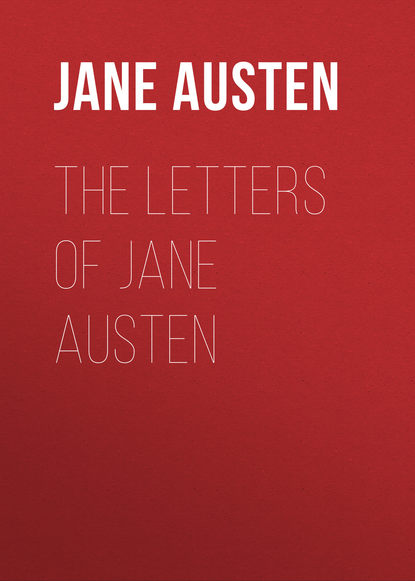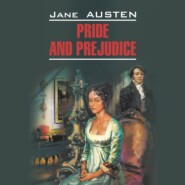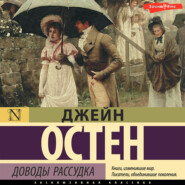По всем вопросам обращайтесь на: info@litportal.ru
(©) 2003-2025.
✖
The Letters of Jane Austen
Настройки чтения
Размер шрифта
Высота строк
Поля
She has written to my aunt, and we are all impatient for the answer. I do not know how to give up the idea of our both going to Paragon in May. Your going I consider as indispensably necessary, and I shall not like being left behind; there is no place here or hereabouts that I shall want to be staying at, and though, to be sure, the keep of two will be more than of one, I will endeavor to make the difference less by disordering my stomach with Bath buns; and as to the trouble of accommodating us, whether there are one or two, it is much the same.
According to the first plan, my mother and our two selves are to travel down together, and my father follow us afterwards in about a fortnight or three weeks. We have promised to spend a couple of days at Ibthorp in our way. We must all meet at Bath, you know, before we set out for the sea, and, everything considered, I think the first plan as good as any.
My father and mother, wisely aware of the difficulty of finding in all Bath such a bed as their own, have resolved on taking it with them; all the beds, indeed, that we shall want are to be removed, – namely, besides theirs, our own two, the best for a spare one, and two for servants; and these necessary articles will probably be the only material ones that it would answer to send down. I do not think it will be worth while to remove any of our chests of drawers; we shall be able to get some of a much more commodious sort, made of deal, and painted to look very neat; and I flatter myself that for little comforts of all kinds our apartment will be one of the most complete things of the sort all over Bath, Bristol included.
We have thought at times of removing the sideboard, or a Pembroke table, or some other piece of furniture, but, upon the whole, it has ended in thinking that the trouble and risk of the removal would be more than the advantage of having them at a place where everything may be purchased. Pray send your opinion.
Martha has as good as promised to come to us again in March. Her spirits are better than they were…
My mother bargains for having no trouble at all in furnishing our house in Bath, and I have engaged for your willingly undertaking to do it all. I get more and more reconciled to the idea of our removal. We have lived long enough in this neighborhood: the Basingstoke balls are certainly on the decline, there is something interesting in the bustle of going away, and the prospect of spending future summers by the sea or in Wales is very delightful. For a time we shall now possess many of the advantages which I have often thought of with envy in the wives of sailors or soldiers. It must not be generally known, however, that I am not sacrificing a great deal in quitting the country, or I can expect to inspire no tenderness, no interest, in those we leave behind…
Yours affectionately, J. A.
Miss Austen,
Godmersham Park, Faversham, Kent.
XIX
Steventon, Thursday (January 8).
My dear Cassandra, – The "perhaps" which concluded my last letter being only a "perhaps," will not occasion your being overpowered with surprise, I dare say, if you should receive this before Tuesday, which, unless circumstances are very perverse, will be the case. I received yours with much general philanthropy, and still more peculiar good-will, two days ago; and I suppose I need not tell you that it was very long, being written on a foolscap sheet, and very entertaining, being written by you.
Mr. Payne has been dead long enough for Henry to be out of mourning for him before his last visit, though we knew nothing of it till about that time. Why he died, or of what complaint, or to what noblemen he bequeathed his four daughters in marriage, we have not heard.
I am glad that the Wildmans are going to give a ball, and hope you will not fail to benefit both yourself and me by laying out a few kisses in the purchase of a frank. I believe you are right in proposing to delay the cambric muslin, and I submit with a kind of voluntary reluctance.
Mr. Peter Debary has declined Deane curacy; he wishes to be settled near London. A foolish reason! as if Deane were not near London in comparison of Exeter or York. Take the whole world through, and he will find many more places at a greater distance from London than Deane than he will at a less. What does he think of Glencoe or Lake Katherine?
I feel rather indignant that any possible objection should be raised against so valuable a piece of preferment, so delightful a situation! – that Deane should not be universally allowed to be as near the metropolis as any other country villages. As this is the case, however, as Mr. Peter Debary has shown himself a Peter in the blackest sense of the word, we are obliged to look elsewhere for an heir; and my father has thought it a necessary compliment to James Digweed to offer the curacy to him, though without considering it as either a desirable or an eligible situation for him. Unless he is in love with Miss Lyford, I think he had better not be settled exactly in this neighborhood; and unless he is very much in love with her indeed, he is not likely to think a salary of 50l. equal in value or efficiency to one of 75l.
Were you indeed to be considered as one of the fixtures of the house! – but you were never actually erected in it either by Mr. Egerton Brydges or Mrs. Lloyd…
You are very kind in planning presents for me to make, and my mother has shown me exactly the same attention; but as I do not choose to have generosity dictated to me, I shall not resolve on giving my cabinet to Anna till the first thought of it has been my own.
Sidmouth is now talked of as our summer abode. Get all the information, therefore, about it that you can from Mrs. C. Cage.
My father's old ministers are already deserting him to pay their court to his son. The brown mare, which, as well as the black, was to devolve on James at our removal, has not had patience to wait for that, and has settled herself even now at Deane. The death of Hugh Capet, which, like that of Mr. Skipsey, though undesired, was not wholly unexpected, being purposely effected, has made the immediate possession of the mare very convenient, and everything else I suppose will be seized by degrees in the same manner. Martha and I work at the books every day.
Yours affectionately, J. A.
Miss Austen,
Godmersham Park, Faversham, Kent.
XX
Steventon, Wednesday (January 14).
Poor Miss Austen! It appears to me that I have rather oppressed you of late by the frequency of my letters. You had hoped not to hear from me again before Tuesday, but Sunday showed you with what a merciless sister you had to deal. I cannot recall the past, but you shall not hear from me quite so often in future.
Your letter to Mary was duly received before she left Deane with Martha yesterday morning, and it gives us great pleasure to know that the Chilham ball was so agreeable, and that you danced four dances with Mr. Kemble. Desirable, however, as the latter circumstance was, I cannot help wondering at its taking place. Why did you dance four dances with so stupid a man? Why not rather dance two of them with some elegant brother officer who was struck with your appearance as soon as you entered the room?
Martha left you her best love. She will write to you herself in a short time; but trusting to my memory rather than her own, she has nevertheless desired me to ask you to purchase for her two bottles of Steele's lavender water when you are in town, provided you should go to the shop on your own account, otherwise you may be sure that she would not have you recollect the request.
James dined with us yesterday, wrote to Edward in the evening, filled three sides of paper, every line inclining too much towards the northeast, and the very first line of all scratched out, and this morning he joins his lady in the fields of Elysium and Ibthorp.
Last Friday was a very busy day with us. We were visited by Miss Lyford and Mr. Bayle. The latter began his operations in the house, but had only time to finish the four sitting-rooms; the rest is deferred till the spring is more advanced and the days longer. He took his paper of appraisement away with him, and therefore we only know the estimate he has made of one or two articles of furniture which my father particularly inquired into. I understand, however, that he was of opinion that the whole would amount to more than two hundred pounds, and it is not imagined that this will comprehend the brewhouse and many other, etc., etc.
Miss Lyford was very pleasant, and gave my mother such an account of the houses in Westgate Buildings, where Mrs. Lyford lodged four years ago, as made her think of a situation there with great pleasure, but your opposition will be without difficulty decisive, and my father, in particular, who was very well inclined towards the Row before, has now ceased to think of it entirely. At present the environs of Laura Place seem to be his choice. His views on the subject are much advanced since I came home; he grows quite ambitious, and actually requires now a comfortable and a creditable-looking house.
On Saturday Miss Lyford went to her long home, – that is to say, it was a long way off, – and soon afterwards a party of fine ladies issuing from a well-known commodious green vehicle, their heads full of Bantam cocks and Galinies, entered the house, – Mrs. Heathcote, Mrs. Harwood, Mrs. James Austen, Miss Bigg, Miss Jane Blachford.
Hardly a day passes in which we do not have some visitor or other: yesterday came Mrs. Bramstone, who is very sorry that she is to lose us, and afterwards Mr. Holder, who was shut up for an hour with my father and James in a most awful manner. John Bond est à lui…
XXI
Steventon, Wednesday (January 21).
Expect a most agreeable letter, for not being overburdened with subject (having nothing at all to say), I shall have no check to my genius from beginning to end.
Well, and so Prank's letter has made you very happy, but you are afraid he would not have patience to stay for the "Haarlem," which you wish him to have done as being safer than the merchantman. Poor fellow! to wait from the middle of November to the end of December, and perhaps even longer, it must be sad work; especially in a place where the ink is so abominably pale. What a surprise to him it must have been on October 20, to be visited, collared, and thrust out of the "Petterel" by Captain Inglis. He kindly passes over the poignancy of his feelings in quitting his ship, his officers, and his men.
What a pity it is that he should not be in England at the time of this promotion, because he certainly would have had an appointment, so everybody says, and therefore it must be right for me to say it too. Had he been really here, the certainty of the appointment, I dare say, would not have been half so great, but as it could not be brought to the proof, his absence will be always a lucky source of regret.
Eliza talks of having read in a newspaper that all the first lieutenants of the frigates whose captains were to be sent into line-of-battle ships were to be promoted to the rank of commanders. If it be true, Mr. Valentine may afford himself a fine Valentine's knot, and Charles may perhaps become first of the "Endymion," though I suppose Captain Durham is too likely to bring a villain with him under that denomination…
The neighborhood have quite recovered the death of Mrs. Rider, – so much so, that I think they are rather rejoiced at it now; her things were so very dear! and Mrs. Rogers is to be all that is desirable. Not even death itself can fix the friendship of the world…
The Wylmots being robbed must be an amusing thing to their acquaintance, and I hope it is as much their pleasure as it seems their avocation to be subjects of general entertainment.
I have a great mind not to acknowledge the receipt of your letter, which I have just had the pleasure of reading, because I am so ashamed to compare the sprawling lines of this with it. But if I say all that I have to say, I hope I have no reason to hang myself…
Why did not J. D. make his proposals to you? I suppose he went to see the cathedral, that he might know how he should like to be married in it…
Miss Austen,
Godmersham Park, Faversham, Kent.
XXII
Southampton, Wednesday (January 7, 1807).
My dear Cassandra, – You were mistaken in supposing I should expect your letter on Sunday; I had no idea of hearing from you before Tuesday, and my pleasure yesterday was therefore unhurt by any previous disappointment. I thank you for writing so much; you must really have sent me the value of two letters in one. We are extremely glad to hear that Elizabeth is so much better, and hope you will be sensible of still further amendment in her when you return from Canterbury.
Of your visit there I must now speak "incessantly;" it surprises, but pleases me more, and I consider it as a very just and honorable distinction of you, and not less to the credit of Mrs. Knight. I have no doubt of your spending your time with her most pleasantly in quiet and rational conversation, and am so far from thinking her expectations of you will be deceived, that my only fear is of your being so agreeable, so much to her taste, as to make her wish to keep you with her forever. If that should be the case, we must remove to Canterbury, which I should not like so well as Southampton.
When you receive this, our guests will be all gone or going; and I shall be left to the comfortable disposal of my time, to ease of mind from the torments of rice puddings and apple dumplings, and probably to regret that I did not take more pains to please them all.
Mrs. J. Austen has asked me to return with her to Steventon; I need not give my answer; and she has invited my mother to spend there the time of Mrs. F. A.'s confinement, which she seems half inclined to do.

















